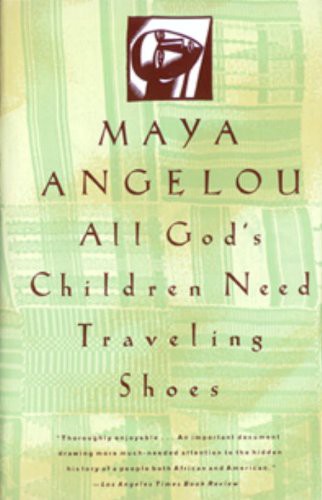
All God's Children Need Traveling Shoes PDF
Preview All God's Children Need Traveling Shoes
"Thoroughly enjoyable . . . an important document drawing more much-needed attention to the hidden history of a people both African and American."--Los Angeles Times Book Review.
From the Trade Paperback edition.
From Publishers WeeklyTo read Angelou's book, the latest in a series of autobiographical works begun with I Know Why the Caged Bird Sings, without being moved would seem impossible. Here, this American poet, actress, civil rights activist and TV producer-director recalls her pilgrimage to Ghana in the early 1960s. Ostensibly, Angelou went there so that her son could study at the University of Ghanato put him (and herself) in touch with long-imagined ancestral roots. Sadly, she was disillusioned by the subtle rejection of native Ghanaians. Fighting this painful sense of not belonging, she plunged into activities; appearing in Genet's play The Blacks with black American performers, she went briefly to Berlin, where she underwent a searing experience dining in the home of a wealthy crypto-Nazi German. Other encounters, even the more pleasurable ones, hardly mitigate the homesickness and hurt underlying Angelou's poignant recall, which includes a meeting with Malcolm X and her visit to a village where, centuries ago, black men sold other black men, women and children to white slave traders. First serial to Essence.
Copyright 1986 Reed Business Information, Inc.
YA Angelou continues the candid chronicle of her life in this fifth volume of her autobiography which began with I Know Why the Caged Bird Sings (Random, 1970). In the early '60s, Angelou worked at the university in Ghana and became involved with the community of Africans and black Americans. Students of African history will find a wealth of information and penetrating impressions of the proud, optimistic new country. Students of American history will learn first-hand of the opinions and feelings of black Americans who, living through the racial crisis of the '60s, came to Africa in search of their historical, spiritual and psychological home. Maya's own journey is at the center of the narrative, however, and readers will appreciate the candor with which she relates her conflicts with some Ghanaians; her romance with an African Muslim; her trip to Germany, where she joins an American acting troupe and confronts her own prejudices; and her struggle to accept her son's manly independence. As in her previous memoirs, the poet's prose sings. Jackie Gropman, Fairfax County Public Library, Va.
Copyright 1986 Reed Business Information, Inc.
